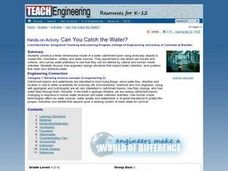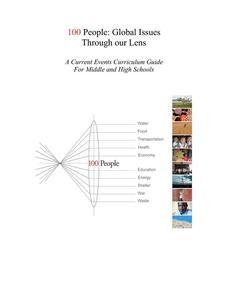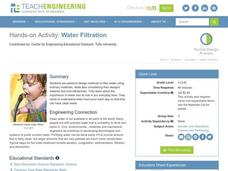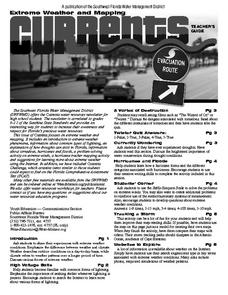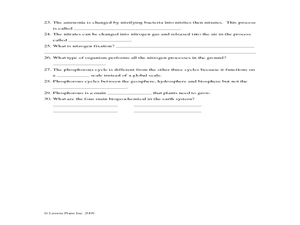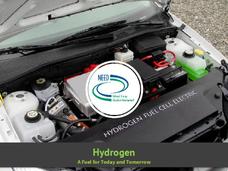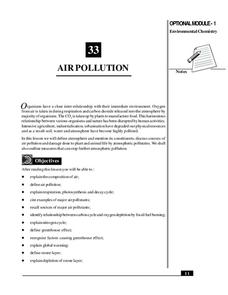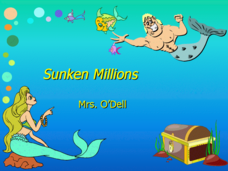Curated OER
Can You Catch the Water?
Students work together to construct a model of a water catchment basin. They survey water patterns and complete experiments to see where rain travels and collects. They discover how engineers design structures that help with drainage.
100 People Foundation
100 People: Global Issues Through Our Lens
If the world were 100 people...17 would not have access to safe drinking water, 18 would not be able to read or write, and 52 would not have a primary education. Using the theme of "100 people," this resource explores other major issues...
Curated OER
A SALT WATER-Y WORLD
Students observe a model of the distribution of the earth's water and compare the relative volumes and percentages of types of water on earth.
Curated OER
Water Filtration
Students work together to examine the role of water in their lives. They discover the process to clean water so it is clean for one to drink. They explore the role of environmental engineers and their problem of getting clean water to...
Curated OER
The Surprise of the Blue Water
Students become aware of factors that effect drinking water quality and how this could effect the health of their school environment. Students compose a business letter reporting their school water quality results to an appropriate...
Curated OER
Water Power
Learners observe a model of a waterwheel to investigate the transformations of energy involved in turning the blades of a hydro-turbine into work. They work as engineers to create a model for a new waterwheel while considering resources,...
Curated OER
Extreme Weather and Mapping
For this environment worksheet, students read an article about extreme weather conditions and mapping it out. They respond to 10 multiple choice questions about what they read. Then, students explain how droughts can occur and the...
Space Awareness
Ocean Acidification
Learn the science behind ocean acidification and its effects on ocean wildlife. Young scientists conduct a laboratory investigation that monitors the acidity level of water. While burning a candle, learners capture the carbon dioxide in...
Curated OER
Biogeochemical Cycles Study Guide
The four cycles in Earth's biogeochemical system are covered in this worksheet. Science stars fill in the blanks or define vocabulary terms pertaining to the hydrologic, carbon, nitrogen, and phosphorous cycles. This resource provides a...
National Energy Education Development Project
Exploring Hydropower
In 2006, about 20 percent of the world's electricity was generated from hydroelectric power. In the presentation, scholars review the water cycle and gravitational energy to begin to understand how humans harness the power of water. They...
National Energy Education Development Project
Introduction to Hydrogen
Every region has a renewable resource that can be used to make hydrogen. But, what is hydrogen and why can it be used as an energy source? Find out with a presentation that answers these questions and then discusses where hydrogen is...
Green Hope High School
Close Readings from The Tempest + New World Readings
What was Shakespeare's intent? That is the question at the heart of a summer assignment designed for AP English Literature. Class members focus on five scenes from The Tempest and compare the interactions of Prospero, Caliban,...
National Institute of Open Schooling
Air Pollution
Seventy percent of the air pollution in China is due to car exhaust. Under the umbrella of environmental chemistry, learners extensively explore air pollution. From the makeup of our atmosphere to sources of major air pollutants, classes...
PBS
Cloud Clues
It's cloudy with a good chance of learning! An inquiry-based lesson begins with an exploration of transparent, translucent, and opaque materials. Young scientists then connect their learning to the different cloud types as they take the...
K12 Reader
Taiga Ecosystems
Introduce your class to another type of ecosystem, the taiga ecosystem, through a reading passage. Class members read the text and then respond to five reading questions about the content of the passage.
Curated OER
All Aboard
Explore the U.S.S. Nevada. Researchers use primary sources, secondary sources, children's books and websites to study the naval ship. Their study commences with a class alphabet book on the ship. Intended to be part of a lesson on...
Curated OER
Runoff: Intro to Watersheds
Students are taught that a watershed is, what types of basic land cover are impermeable and permeable to water. They trace the flow of water around their school and around their home. Students determine what watershed their school is a...
Curated OER
Water Pollution
Students explore the causes of water pollution. In this environmental lesson plan, students conduct experiments with natural filtration systems.
Curated OER
Ground Surfaces and Infiltration
Learners study permeability and apply the concept to different types of ground materials. In this ground surfaces lesson students complete a lab and fill out a table of their results.
Curated OER
What Are We?
Young scholars describe different types of water pollutants. They complete experiments in which they observe the affects of water pollution on algae. They also brainstorm and list three causes of each water pollutant.
Curated OER
Alternative Energy Sources
Students recognize that people have various opinions on the use of renewable energy.In this renewable energy lesson, students research to find the best uses of renewable energy. Students create an original design for a group...
Curated OER
Wetland Habitats
Eighth graders explore the program Alice and the Internet to research wetland habitats. For this habitat lesson students build their own Alice world that includes wetland habitats, food sources and ways to protect the...
Curated OER
N, B, and T: Pollutants Three
Students explore nutrient, bacterial, and toxic surface water pollution. They identify the amount of water they use each day and summarize the kinds of substances that cause water pollution. They predict what will happen in water...
Curated OER
Sunken Millions
This PowerPoint provides a game show format with multiple choice questions about fresh and salt water. Topics include sources of water, water geography, uses of water, and the water cycle.


